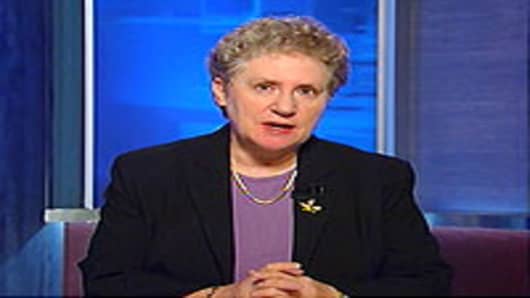But this interview with Abby Joseph Cohen is fantastic—and devastating. Solomon reveals that Cohen has no real answers to questions about the purpose of a place like Goldman Sachs and the firm’s role in the financial crisis.
Solomon asks a couple of tough questions about the lack of women in the top ranks of firms like Goldman Sachs , which Cohen handles rather well. They then move on to Facebook, where we learn that Abby Joseph Cohen doesn’t have a Facebook page and will not comment on the deal with Goldman Sachs.
But where things really get nasty is when Solomon begins to ask whether it is “ethically justifiable that certain bankers earn $50 million or $60 million a year at a time when unemployment is nearly 10 percent and income inequality is widening in this country?”
Cohen’s first attempt to answer is a feint followed by a counter-punch. She points out that other categories of people make lots of money—athletes, entertainers, CEOs. She then points out that the CEO of the New York Times makes plenty of money. Solomon’s answer is brilliant.
“What about her? She’s contributing a newspaper to society, which presumably keeps the American public better informed. It has been widely observed that the financial-services industry is not creating a product in the tangible sense,” Solomon says.
Here’s where Cohen stumbles. She is challenged with providing an existential justification for her firm. But what she offers, instead, is a justification for commercial banking—which no one is challenging.
It’s unfortunate that — I think that there is not a good understanding as to the role of financial intermediaries. For example, without banks it’s hard to see how businesses would get the money they need to grow and to hire new workers. Let’s not lose track of the fact that most people need to borrow in order to buy a home, and if you don’t have banks, that’s not going to happen.
Courtney Comstock at Business Insider points out why this is inadequate:
Her answer is interesting because at face value, those are two of the main duties of commercial banks, and neither of them are central to Goldman's business... But apparently Cohen thinks the value Goldman adds to society could more or less be done by a commercial bank.
I do not want to be harsh on Cohen here. I don’t think it’s her fault that she cannot justify Goldman Sachs. That’s not her job as an investment strategist—it’s the job of those at the top of the firm. And, as I pointed out a couple of weeks ago, Goldman’s top executives blew the opportunity to provide the public and their own people with a justification of their business.
When Goldman first announced it was conducting a review of its business, I wrote:
there was some hope … that Goldman might produce something truly profound in response to the crisis. Although Lloyd Blankfein is commonly understood by long-time Goldman employees and alumns to lack the philosophical or moral depth of some of his predecessors, some thought that the crisis may have awoken something inside of the man. Something that pointed beyond profit and loss to a deeper understanding of the role an investment banking and trading firm like Goldman plays in the world.
Of course, as we all know, that didn’t emerge. Instead, we got some blathering on about being client focused, some moving around of boxes on the org chart, and a few people moved from what sounded like prop trading into what sounds a little less like prop trading.
As a result, Goldman continues to leave its people helpless in the face of challenges like the one Solomon posed to Cohen.
________________________________________________
Questions? Comments? Email us atNetNet@cnbc.com
Follow John on Twitter @ twitter.com/Carney
Follow NetNet on Twitter @ twitter.com/CNBCnetnet
Facebook us @ www.facebook.com/NetNetCNBC



